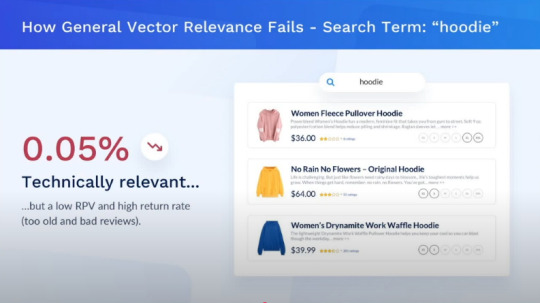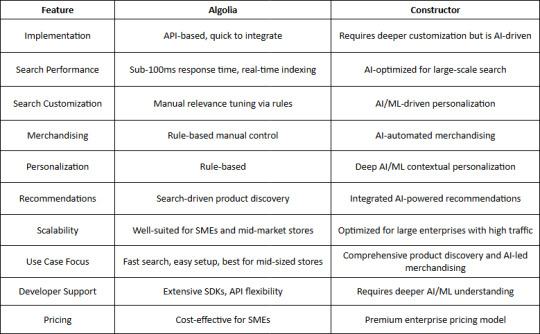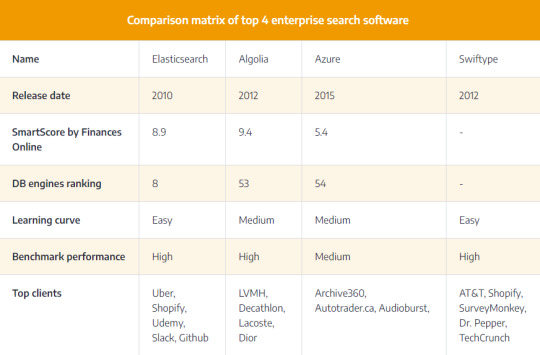#algolia search vs elasticsearch
Explore tagged Tumblr posts
Text
https://prosperasoft.com/blog/cloud/algolia-vs-elasticsearch/
#algolia vs elasticsearch#algolia search vs elasticsearch#elastic search vs algolia#algolia vs elastic search#algolia vs elasticsearch performance#difference between algolia vs elasticsearch
0 notes
Text
Algolia vs. Connector Search Tools: A Comprehensive Comparison
Evaluating Performance, Features, and Usability to Help You Choose the Right Search Solution.
When it comes to implementing a powerful search and discovery solution for eCommerce, two major players often come up: Algolia and Constructor. While both provide advanced search capabilities, their workflows, implementations, and approach to AI-driven product discovery set them apart. This blog takes a deep dive into their differences, focusing on real-world applications, technical differentiators, and the impact on business KPIs.
Overview of Algolia and Constructor
Algolia
Founded in 2012, Algolia is a widely recognized search-as-a-service platform.
It provides instant, fast, and reliable search capabilities with an API-first approach.
Commonly used in various industries, including eCommerce, SaaS, media, and enterprise applications.
Provides keyword-based search with support for vector search and AI-driven relevance tuning.
Constructor
A newer entrant in the space, Constructor focuses exclusively on eCommerce product discovery.
Founded in 2015 and built from the ground up with clickstream-driven AI for ranking and recommendations.
Used by leading eCommerce brands like Under Armour and Home24.
Aims to optimize business KPIs like conversion rates and revenue per visitor.
Key Differences in Implementation and Workflows
1. Search Algorithm and Ranking Approach
Algolia:
Uses keyword-based search (TF-IDF, BM25) with additional AI-driven ranking enhancements.
Supports vector search, semantic search, and hybrid approaches.
Merchandisers can fine-tune relevance manually using rule-based controls.
Constructor:
Built natively on a Redis-based core rather than Solr or ElasticSearch.
Prioritizes clickstream-driven search and personalization, focusing on what users interact with.
Instead of purely keyword relevance, it optimizes for "attractiveness", ranking results based on a user’s past behavior and site-wide trends.
Merchandisers work with AI, using a human-interpretable dashboard to guide search ranking rather than overriding it.
2. Personalization & AI Capabilities
Algolia:
Offers personalization via rules and AI models that users can configure.
Uses AI for dynamic ranking adjustments but primarily relies on structured data input.
Constructor:
Focuses heavily on clickstream data, meaning every interaction—clicks, add-to-cart actions, and conversions—affects future search results.
Uses Transformer models for context-aware personalization, dynamically adjusting rankings in real-time.
AI Shopping Assistant allows for conversational product discovery, using Generative AI to enhance search experiences.
3. Use of Generative AI
Algolia:
Provides semantic search and AI-based ranking but does not have native Generative AI capabilities.
Users need to integrate third-party LLMs (Large Language Models) for AI-driven conversational search.
Constructor:
Natively integrates Generative AI to handle natural language queries, long-tail searches, and context-driven shopping experiences.
AI automatically understands customer intent—for example, searching for "I'm going camping in Yosemite with my kids" returns personalized product recommendations.
Built using AWS Bedrock and supports multiple LLMs for improved flexibility.
4. Merchandiser Control & Explainability
Algolia:
Provides rule-based tuning, allowing merchandisers to manually adjust ranking factors.
Search logic and results are transparent but require manual intervention for optimization.
Constructor:
Built to empower merchandisers with AI, allowing human-interpretable adjustments without overriding machine learning.
Black-box AI is avoided—every recommendation and ranking decision is traceable and explainable.
Attractiveness vs. Technical Relevance: Prioritizes "what users want to buy" over "what matches the search query best".
5. Proof-of-Concept & Deployment
Algolia:
Requires significant setup to run A/B tests and fine-tune ranking.
Merchandisers and developers must manually configure weighting and relevance.
Constructor:
Offers a "Proof Schedule", allowing retailers to test before committing.
Retailers install a lightweight beacon, send a product catalog, and receive an automated performance analysis.
A/B tests show expected revenue uplift, allowing data-driven decision-making before switching platforms.
Real-World Examples & Business Impact
Example 1: Searching for a Hoodie
A user searches for "hoodie" on an eCommerce website using Algolia vs. Constructor:
Algolia's Approach: Shows hoodies ranked based on keyword relevance, possibly with minor AI adjustments.

Source : YouTube - AWS Partner Network
Constructor's Approach: Learns from past user behavior, surfacing high-rated hoodies in preferred colors and styles, increasing the likelihood of conversion.

Source : YouTube - AWS Partner Network
Example 2: Conversational Search for Camping Gear
A shopper types, "I'm going camping with my preteen kids for the first time in Yosemite. What do I need?"
Algolia: Requires manual tagging and structured metadata to return relevant results.
Constructor: Uses Generative AI and Transformer models to understand the context and intent, dynamically returning the most relevant items across multiple categories.
Which One Should You Choose?

Why Choose Algolia?
Ease of Implementation – Algolia provides a quick API-based setup, making it ideal for eCommerce sites looking for a fast integration process.
Speed & Performance – With real-time indexing and instant search, Algolia is built for speed, ensuring sub-100ms response times.
Developer-Friendly – Offers extensive documentation, SDKs, and a flexible API for developers to customize search behavior.
Rule-Based Merchandising – Allows businesses to manually tweak search relevance with robust rules and business logic.
Cost-Effective for SMEs – More affordable for smaller eCommerce businesses with straightforward search needs.
Enterprise-Level Scalability – Can support growing businesses but requires manual optimization for handling massive catalogs.
Search-Driven Recommendations – While Algolia supports recommendations, they are primarily based on search behaviors rather than deep AI.
Manual Control Over Search & Merchandising – Provides businesses the flexibility to define search relevance and merchandising manually.
Strong Community & Developer Ecosystem – Large user base with extensive community support and integrations.
Why Choose Constructor?
Ease of Implementation – While requiring more initial setup, Constructor offers pre-trained AI models that optimize search without extensive manual configurations.
Speed & Performance – Uses AI-driven indexing and ranking to provide high-speed, optimized search results for large-scale retailers.
Developer-Friendly – Requires deeper AI/ML understanding but provides automation that reduces manual tuning efforts.
Automated Merchandising – AI-driven workflows reduce the need for manual intervention, optimizing conversion rates.
Optimized for Large Retailers – Designed for enterprises requiring full AI-driven control over search and discovery.
Deep AI Personalization – Unlike Algolia’s rule-based system, Constructor uses advanced AI/ML to provide contextual, personalized search experiences.
End-to-End Product Discovery – Goes beyond search, incorporating personalized recommendations, dynamic ranking, and automated merchandising.
Scalability – Built to handle massive catalogs and high traffic loads with AI-driven performance optimization.
Integrated AI-Powered Recommendations – Uses AI-driven models to surface relevant products in real-time based on user intent and behavioral signals.
Data-Driven Decision Making – AI continuously optimizes search and merchandising strategies based on real-time data insights.
Conclusion
Both Algolia and Constructor are excellent choices, but their suitability depends on your eCommerce business's needs:
If you need a general-purpose, fast search engine, Algolia is a great fit.
If your focus is on eCommerce product discovery, personalization, and revenue optimization, Constructor provides an AI-driven, clickstream-based solution designed for maximizing conversions.
With the evolution of AI and Generative AI, Constructor is positioning itself as a next-gen alternative to traditional search engines, giving eCommerce brands a new way to drive revenue through personalized product discovery.
This Blog is driven by our experience with product implementations for customers.
Connect with US
Thanks for reading Ragul's Blog! Subscribe for free to receive new posts and support my work.
1 note
·
View note
Text
Top 4 Enterprise Search Software in 2021
Nowadays, we cannot imagine our life without Google. We use it daily to find solutions for a wide range of challenges from home issues to business problems.
The Internet Live Stats Tracker states that over 40,000 users Google data every second that transforms into enormous 1.2 trillion search requests a year. It looks spectacular, right?

This statistics allows us to realize that millions of people are ready to consume gigabytes of data and the power of search engines only tends to grow. What’s more, data search becomes an integral attribute and tool for any business to find, analyze information, and improve scalability.
As Peter Morville, a consultant, influencer, and co-author of the best-selling book ‘Information Architecture for the World Wide Web’, once said:
What we find changes who we become.
The core reason for businesses to use data search is the generation of valuable insights that let companies step forward and adapt to constantly changing users’ demands.
Here comes enterprise search software that helps entrepreneurs efficiently seek for and analyze data in a matter of seconds. However, what is the best way to find the right and relevant technology solution for your specific business needs?
Today we want to guide you through the top 4 enterprise search software solutions covering their pros and cons to help you make the right decision for your business. Besides, we provide a comparison matrix of these tools to bring a high-level overview of them for your guidance.
Elasticsearch

Established: 8 February 2010
Elasticsearch pricing:
Standard - $16/month
Gold - $19/month
Platinum - $22/month
Enterprise – individual
What is Elasticsearch? So, it is one of the most popular open-source enterprise search software in the Big Data industry with embedded JSON REST API and built on Apache Lucene and Java.
Elasticsearch was released to establish multitenant-capable full-text search and analysis of large amount of data. The tool’s opportunities make Elasticsearch a perfect choice for both middle and enterprise-scale projects that need more resources.
What companies use Elasticsearch?

What are the key features of Elasticsearch?
Scalability and fault tolerance
Multitenancy
Operational stability
Schema-free

Why do we use Elasticsearch at Ascendix?
The key reason Ascendix development teams choose Elasticsearch is the high performance it provides. So, we can avoid 1-3 seconds for a search result to be generated and provide our clients with immediate data without solid delays.
You may ask the following question: “Why is Elasticsearch so fast?”
The answer lies in the essence of shards which are the set of inverted indices. Simply speaking, this enterprise search software generates multiple inverted indices tables each time after indexing which saves much time for both the program and end-users that get immediate results.
Algolia

Established: 2012
Algolia pricing:
Free – up to 10 units (1000 requests)
Standard - $1/unit/month
Gold - $1.5/unit/month
OEM - individual
Companies that use Algolia

Why use Algolia?
Site search
Voice search
Geo search
Mobile search

What are the key features of Algolia Search?
Search rules
InstantSearch
Personalization
A/B testing
Specific search API
Algolia AI

You can learn more details about each enterprise search software feature on their official website.
Azure Cognitive Search

Established: 2008
Azure Search service pricing:
Free – only 50 mb storage
Basic - $73.73/month
Standard S1- $245.28/month
Standard S2 - $981.12/month
Standard S3 – 1,962.24/month
Storage Optimized L1 - $2,802.47/month
Storage Optimized L2 – individual
What is Azure Cognitive Search?
It is a cloud search service by Microsoft with integrated AI features that allow to quickly identify and analyze relevant data of any scale. This way, Azure cognitive search allows you to build mobile and web applications with powerful enterprise search features.
Companies that use Azure Search

Key features of Azure full-text search
Powerful indexing
Data processing
Query & Relevancy Ranking

Swiftype

Established: January 2012
Swiftype pricing:
Swiftype App Search - $49/mo
Swiftype Site Search - $79/mo
Swiftype search is a cloud-based and customizable software-as-a-service platform that allows your business to create a powerful search experience and work with data efficiently. Established in 2012, the company has acquired $23 million and has been improving the product continuously.
What companies use Swiftype?

Core features of Swiftype
Powerful Search Algorithm
Content ingestion and syncing
Deep analytics
Real-time indexing

Enterprise Search Software Comparison Matrix
Each search tool mentioned above has its benefits and drawbacks in terms of specific aspects. In order to help you choose the best enterprise search software, let’s look at the comparison of Elasticsearch vs Algolia vs Azure vs Swiftype below.

Final words
So, we have discussed the most trending and powerful search solutions. It's worth noting that there is no omni-purpose software that fits any business needs.
For this reason, take a look at these tools, compare them, and make the right choice that will perfectly suit your company's demands.
For more information, read the full article 4 Leading Enterprise Search Software to Look For in 2021.
2 notes
·
View notes